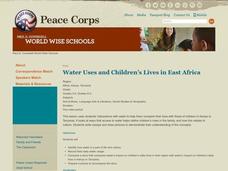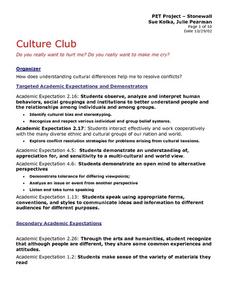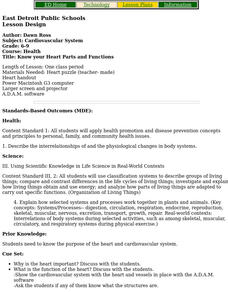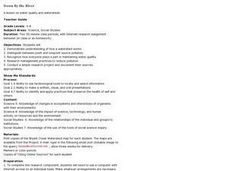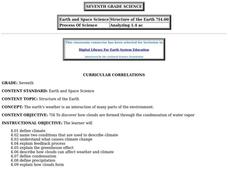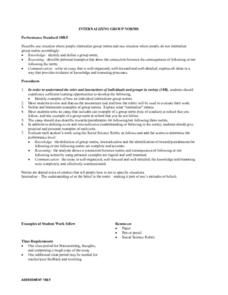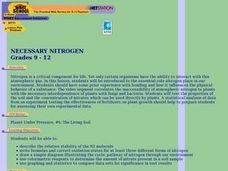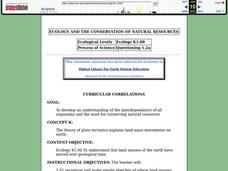Curated OER
Water Uses and Children's Lives in East Africa
Learners identify how water use is part of life and culture. Students record their daily water usage and compare results with classmates. Learners complete the graphic organizer on water and children. Students compose an essay, which...
Curated OER
Cougar or Human: Which Needs Protection?
Students research the biology and natural history of the cougar. Students conduct Internet research to determine how cougars have been protected by humans and how it is affected by human decisions. Students write about reconciling...
Curated OER
Culture Club Do You Really Want To Hurt Me? Do You Really Want To Make Me Cry?
Fourth graders investigate cultural differences and determine how this knowledge will help resolve conflicts. They look at how the history of Kentucky was influenced by Native Americans. They design a conflict resolution presentation...
Curated OER
The Hundred Penny Box
Students analyze the advantages of regular saving and how savings grow with compounding. After reading the story "The Hundred Penny Box", students define the terms "interest," "interest rate," and "compounding." Through several...
Curated OER
Terrorism and General Information about September 11, 2001
Students view a variety of pictures from September 11, 2001 either online or a slideshow. They discuss how the pictures make them feel and then complete a KWL chart highlighting what they already know about 9/11, and what they would like...
Curated OER
Changing the World: Social Entrepreneurs Part One
Students analyze the purpose of a social entrepreneur. In this entrepreneurship lesson, students create a "help wanted" advertisement and graphic organizer to provide information on how a social entrepreneur seeks long-term change by...
Curated OER
Know your Heart Parts and Functions
Students put together a 3-D interactive "heart" puzzle and learn the names of heart parts.
Curated OER
Taxation Without Representation
Eighth graders empathize with how colonists felt when they were taxed without representation. They use a metaphor of students and a school principal to describe the strained relationship that developed between the colonies and Britain.
Curated OER
Down By the River
Students examine how watersheds work and determine the difference between point and nonpoint source pollution. They research management practices to reduce pollution and investigate how everyone can participate in reducing water pollution.
Curated OER
Structure of the Earth
Seventh graders study the cause of climate change, and how clouds form and affect weather. They define condensation and precipitation, the greenhouse effect and the water cycle.
Curated OER
Lost Worlds
Students, while using the strategy of identifying the main idea and supporting details, explore the three nonfiction selections of the lost worlds of Machu Picchu high in the Andes Mountains, Great Zimbabwe, and Anasazi. In addition,...
Curated OER
Catalase Enzyme
Pupils design and conduct an experiment to test their ideas about how to speed up or slow down the rate of an enzyme-catalyzed reaction. They have access to an array of physical and chemical factors that might influence enzyme activity....
Curated OER
Internalizing Group Norms
Students consider how to internalize group norms. They descirbe a situation where people internalize group norms and a situation where people do not internalize group norms. They brainstorm examples of group norms and define...
Curated OER
Anthropology and Sociology
Learners examine the combined subjects of anthropology and sociology and explain how the disciplines would study the same issue. On poster board, they locate or draw pictures related to the two subjects. Once this is completed, students...
Curated OER
Unity Versus Diversity
Young scholars explore the 50 State Quarters program and how it represents diversity and unity of the United States. In pairs, they examine quarter designs to gain information about the culture of each state. Students create charts to...
Curated OER
Great Salt Lake
Fourth graders make an ecosystem that brine shrimp can live in and take data as to what level of salinity the water is, how cold it is, and other data that students may think is important. They also hypothesize and predict the outcomes...
Curated OER
Trouble in the Troposphere
Students Use data sets from MY NASA DATA to produce graphs comparing monthly and yearly ozone averages of several U.S. cities. They analyze and evaluate the data and predict trends based on the data. In addition, they discuss and...
Curated OER
Making Good Money Choices
Students play a game called Philanthropy EconAround Bingo and learn how to make smart money choices. For this money choices lesson plan, students play the game and discuss what choices would be better than others to maximize their money.
Curated OER
Water and Ice
Learners examine how water changes state, from a liquid to a solid. In this water lesson students study the water cycle and how temperature and pressure effect it.
Curated OER
Note Taking: Research on the Middle Ages
Learners explore the Middle Ages. In this research skills instructional activity, students research selected Internet sources regarding the Middle Ages and use the provided graphic organizers to take notes regarding the information they...
Curated OER
ESL Holiday Lessons: National Dog Day
In this language skills worksheet, students read an article regarding National Dog Day. Students respond to 6 matching questions, 29 fill in the blank questions, 30 multiple choice questions, 12 word scramble ...
Curated OER
Understanding by Design
Fourth graders examine the origins, structures, and functions of the Colorado government. In this understanding by design lesson, 4th graders explore the three branches of government. Students identify the roles of state leaders and the...
Curated OER
Necessary Nitrogen
High schoolers view a video that presents the biogeochemical cycle of nitrogen. They compare types of soils and consider how different fertilizers affect soil composition.
Curated OER
Ecology And the Conservation of Natural Resources
Students study Alfred Wegener's theory of continental drift and how the continents were connected in one large land mass called Pangaea. They examine plate tectonics and the theory that the earth's surface is composed of large moving...


